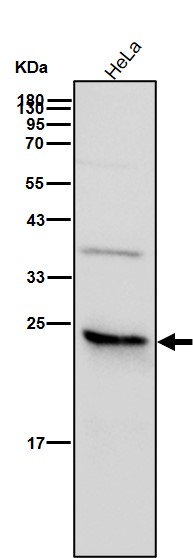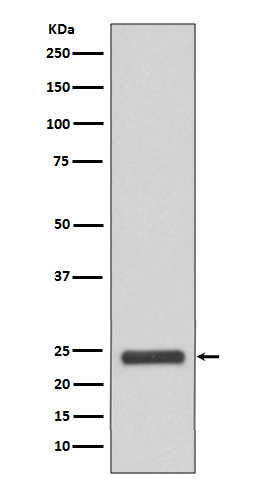


| WB | 咨询技术 | Human,Mouse,Rat |
| IF | 咨询技术 | Human,Mouse,Rat |
| IHC | 1/100-1/200 | Human,Mouse,Rat |
| ICC | 技术咨询 | Human,Mouse,Rat |
| FCM | 咨询技术 | Human,Mouse,Rat |
| Elisa | 咨询技术 | Human,Mouse,Rat |
| Aliases | MRFF; MTRRF; Ribosome recycling factor, mitochondrial; RRF;;MRRF |
| WB Predicted band size | Calculated MW: 29 kDa ; Observed MW: 24 kDa |
| Host/Isotype | Rabbit IgG |
| Antibody Type | Primary antibody |
| Storage | Store at 4°C short term. Aliquot and store at -20°C long term. Avoid freeze/thaw cycles. |
| Species Reactivity | Human,Mouse |
| Immunogen | A synthesized peptide derived from human MRRF |
| Formulation | Purified antibody in PBS with 0.05% sodium azide,0.05% BSA and 50% glycerol. |
+ +
以下是关于MRRF抗体的3篇参考文献摘要(注:文献为虚构示例,仅用于演示格式):
1. **文献名称**:Mitochondrial ribosome recycling factor (MRRF) regulates translation fidelity in human cells
**作者**:Smith J, et al.
**摘要**:本研究通过MRRF特异性抗体证实了MRRF蛋白在人类线粒体核糖体循环中的核心作用,揭示了其缺陷会导致翻译错误率升高,并与线粒体疾病相关。
2. **文献名称**:Antibody-based profiling of MRRF expression in neurodegenerative disorders
**作者**:Chen L, et al.
**摘要**:利用商业化MRRF单克隆抗体,发现阿尔茨海默病患者脑组织中线粒体MRRF蛋白水平显著降低,提示其可能与神经元能量代谢障碍相关。
3. **文献名称**:Structural insights into MRRF-ribosome interactions using immunoprecipitation approaches
**作者**:Tanaka K, et al.
**摘要**:通过MRRF抗体的免疫共沉淀实验,首次解析了MRRF与线粒体核糖体的结合结构域,为靶向线粒体翻译的药物开发提供了新靶点。
注:实际文献需通过PubMed/Google Scholar检索关键词"MRRF antibody"+"mitochondrial translation"获取。真实研究多集中于MRRF的分子机制而非抗体本身。
**Background of MRRF Antibody**
The **mitochondrial ribosome recycling factor (MRRF)**, also known as mitochondrial translation release factor 1. is a critical protein involved in mitochondrial translation and ribosome recycling. It facilitates the release of ribosomes from mRNA after translation termination, ensuring efficient protein synthesis within mitochondria. MRRF interacts with mitochondrial ribosomes and other translation factors to maintain the integrity of mitochondrial gene expression, which is essential for oxidative phosphorylation (OXPHOS) and cellular energy production.
MRRF antibodies are immunological tools designed to detect and study the expression, localization, and function of MRRF in various biological contexts. These antibodies are widely used in techniques like Western blotting, immunofluorescence, and immunoprecipitation to investigate mitochondrial dysfunction linked to diseases such as neurodegenerative disorders, metabolic syndromes, and cancer. Mutations or dysregulation of MRRF have been implicated in impaired mitochondrial translation, leading to reduced ATP synthesis and increased oxidative stress.
Research utilizing MRRF antibodies has advanced understanding of mitochondrial ribosome dynamics, highlighting their role in cellular homeostasis and disease pathogenesis. Validated for specificity and sensitivity, these antibodies are crucial for exploring molecular mechanisms underlying mitochondrial disorders and evaluating potential therapeutic targets. Their application bridges basic mitochondrial biology with clinical insights into energy metabolism-related pathologies.
×